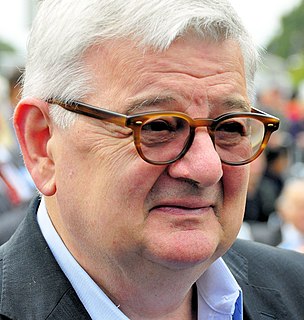A Quote by Albert Camus
It is impossible to give a clear account of the world, but art can teach us to reproduce it-just as the world reproduces itself in the course of its eternal gyrations. The primordial sea indefatigably repeats the same words and casts up the same astonished beings on the same sea-shore.
Related Quotes
The Sea of Galilee and the Dead Sea are made of the same water. It flows down, clean and cool, from the heights of Herman and the roots of the cedars of Lebanon. the Sea of Galilee makes beauty of it, the Sea of Galilee has an outlet. It gets to give. It gathers in its riches that it may pour them out again to fertilize the Jordan plain. But the Dead Sea with the same water makes horror. For the Dead Sea has no outlet. It gets to keep.
"The Universe repeats itself, with the possible exception of history." Of all earthly studies history is the only one that does not repeat itself. ... Astronomy repeats itself; botany repeats itself; trigonometry repeats itself; mechanics repeats itself; compound long division repeats itself. Every sum if worked out in the same way at any time will bring out the same answer. ... A great many moderns say that history is a science; if so it occupies a solitary and splendid elevation among the sciences; it is the only science the conclusions of which are always wrong.
There is no they, only us. We are part of a large fellowship called the human race. We all hurt the same. We all love the same. We all bleed the same. We all need understanding and care. We can't separate ourselves from one another. We are all part of the same vast sea of love, one indivisible divine mind.
I am a star in the firmament that observe the world, despises the world and consumed in its heat. I am the sea by night in a storm the sea shouting that accumulates new sins and to the ancient makes recompense. I am exiled from your world of pride polite, by pride defrauded, I am the king without crown. I am the passion without words without stones of the hearth, without weapons in the war, is my same force that make me sick
...as the slow sea sucked at the shore and then withdrew, leaving the strip of seaweed bare and the shingle churned, the sea birds raced and ran upon the beaches. Then that same impulse to flight seized upon them too. Crying, whistling, calling, they skimmed the placid sea and left the shore. Make haste, make speed, hurry and begone; yet where, and to what purpose? The restless urge of autumn, unsatisfying, sad, had put a spell upon them and they must flock, and wheel, and cry; they must spill themselves of motion before winter came.
The Cardiff Half Marathon has already proved itself to be one of the biggest and best road races in the U.K., and when the best athletes in the world run on the same course, the times should be spectacular. But the real beauty of this event is that ordinary runners get the chance to line up on the same start line as the best athletes in the world.
Let us suppose that an ichthyologist is exploring the life of the ocean. He casts a net into the water and brings up a fishy assortment. Surveying his catch, he proceeds in the usual manner of a scientist to systematise what it reveals. He arrives at two generalisations: No sea-creature is less than two inches long. (2) All sea-creatures have gills. These are both true of his catch, and he assumes tentatively that they will remain true however often he repeats it.
But in a way you can say that after leaving the sea, after all those millions of years of living inside of the sea, we took the ocean with us. When a woman makes a baby, she gives it water, inside her body, to grow in. That water inside her body is almost exactly the same as the water of the sea. It is salty, by just the same amount. She makes a little ocean, in her body. And not only this. Our blood and our sweating, they are both salty, almost exactly like the water from the sea is salty. We carry oceans inside of us, in our blood and our sweat. And we are crying the oceans, in our tears.
May you become as the waves of one sea, stars of the same heaven, fruits adorning the same tree, roses of one garden in order that through you the oneness of humanity may establish its temple in the world of mankind, for you are the ones who are called to uplift the cause of unity among the nations of the earth.









































